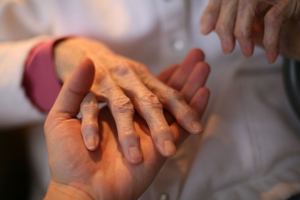
“Too often we underestimate the power of a touch, a smile, a kind word, a listening ear, an honest compliment or the smallest act of caring — all of which have the potential to turn a life around.” —Leo F. Buscaglia
by Ginger Hanson and Carole Fine —
Caregiving often begins with a phone call in the middle of the night when a family unexpectedly finds itself in the throes of taking care of a loved one. As our senior population is living longer, many baby boomers are experiencing the overwhelming responsibility of becoming part of the sandwich generation — having to take care of both their children and their parents at the same time.
This situation often leads to feelings of overload, depression, anger, resentment and frustration for the families, as well as their affected loved ones. The generous act of caregiving can even strain the very relationship they care so much about.
Dementia and Alzheimer’s disease are becoming more prevalent in the senior population. Family members, particularly spouses and adult children, are most likely to become the primary caregivers. They see it as a commitment to take care of their own.
Over time, this commitment can become burdensome. Spouses are likely to experience a decline in physical and mental health, financial resources and time available for themselves. Adult children may become upset by watching a formerly all-powerful parent deteriorate.
Each member of the family is affected by the decline of a loved one — not just the primary caregiver. For example, if the caregiver is an adult daughter, her husband and children may feel neglected because she spends so much time and emotional energy on her parent. Children may become concerned if they see their parent deteriorating during the process of caring for the grandparent.
As patients gradually become less like the people they once were, family caregivers must grieve the loss of the person they remember. In addition to experiencing more stress-related health problems, people who care for loved ones also have less time to meet personal needs and enjoy rest and relaxation.
As the disease progresses, caregivers devote more time to the direct supervision of their patients and less to commitments such as their jobs, family and health. As a result, their satisfaction with their own lives may become severely diminished.
How does one create a system of caregiving that works for the entire family? The solution may include family meetings, enlisting the help of extended family members and/or hiring a certified caregiver. A professionally trained caregiver can provide an unbiased, fresh perspective on the situation, helping reduce the stress and overload. Loved ones can benefit from the aid of caregivers by eliminating the guilt they often feel from the demands their care places on the family. Certified caregivers can provide relief and respite care for these overwhelmed family caregivers.
Professional caregivers, who are not part of the family dynamics and baggage, provide a nurturing and uplifting source of emotional support to clients. Caregivers with life coaching skills have the keen insight to provide the emotional support to nurture, uplift and encourage clients, in addition to assisting them with their personal needs. They may lift the moods of clients through positive support, including loving companionship, personalized coaching, laughter, mindfulness training and guided imagery/meditation.
A caregiver may offer a fresh view of the situation and recommend or help facilitate positive changes in the daily needs care plan. Individuals often experience behavioral changes simply because their basic needs are changing and are not being met. Certified caregivers are trained to easily recognize these changes and provide the solutions, which might be as simple as offering nutritional and hydration modifications.
They also are trained to provide appropriate exercises and activities that uplift the moods of clients and contribute to their well-being and peace of mind. Trained caregivers explore past hobbies and activities enjoyed by their clients.
Developing recreational activities for clients enhances quality of life and creates fun and more satisfaction. This helps individuals maintain their sense of self-identity and improves self-esteem by maintaining their strengths and physical well-being, providing intellectual stimulation, and encouraging independence.
As certified caregivers shop and prepare meals for clients, they can assist in enhancing overall health by encouraging or suggesting better food choices. Through holistic nutritional support, clients often heal more quickly and experience greater vitality.
Certified caregivers provide services for any age individual. Singles benefit from caregivers’ helping hands, as they often have no family members to help them when they experience illness. New mothers and/or mothers on bedrest are another segment of the population who can call on caregivers to meet their needs. Other individuals may need a helping hand after surgery or rehab.
Professional caregivers are passionate about helping their clients preserve dignity and respect and maintaining independence while living safely and comfortably in their residence of choice. They work with the client and/or family members to make every day memorable, with enhanced quality of life and peace of mind.
Ginger Hanson and Carole Fine are the owners of Phoenix Home Care Group, locally owned and operated nonmedical companionship/life coaching services for seniors or other individuals. Ginger Hanson, 480-241-8114 and Carole Fine, 480-298-0488 or www.phoenixhomecaregroup.com.
Reprinted from AzNetNews, Volume 29, Number 2, Apr/May 2010.





February 27, 2012
Anxiety, Coping, Family, Life Coaching, Peace / peace of mind, Self-esteem, Seniors